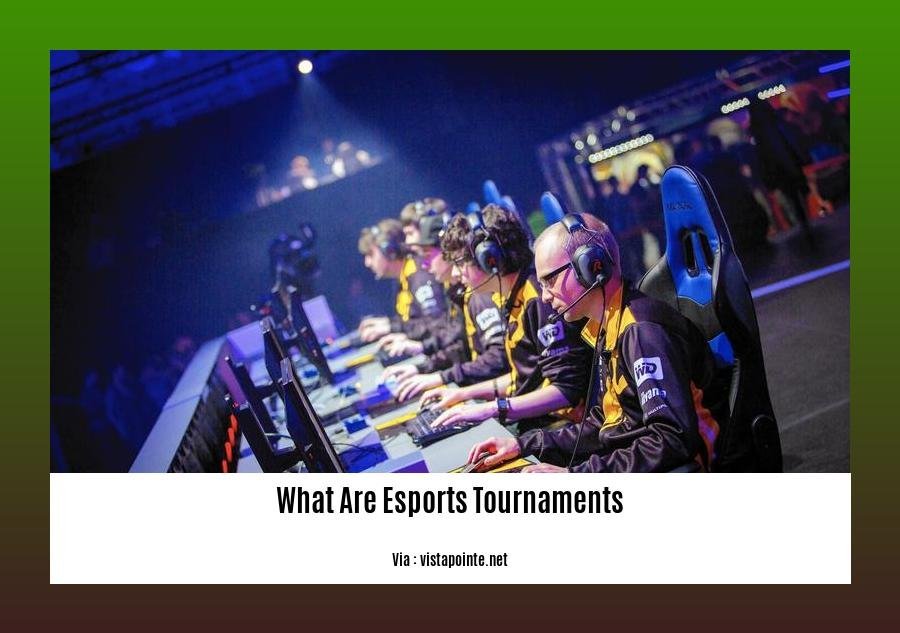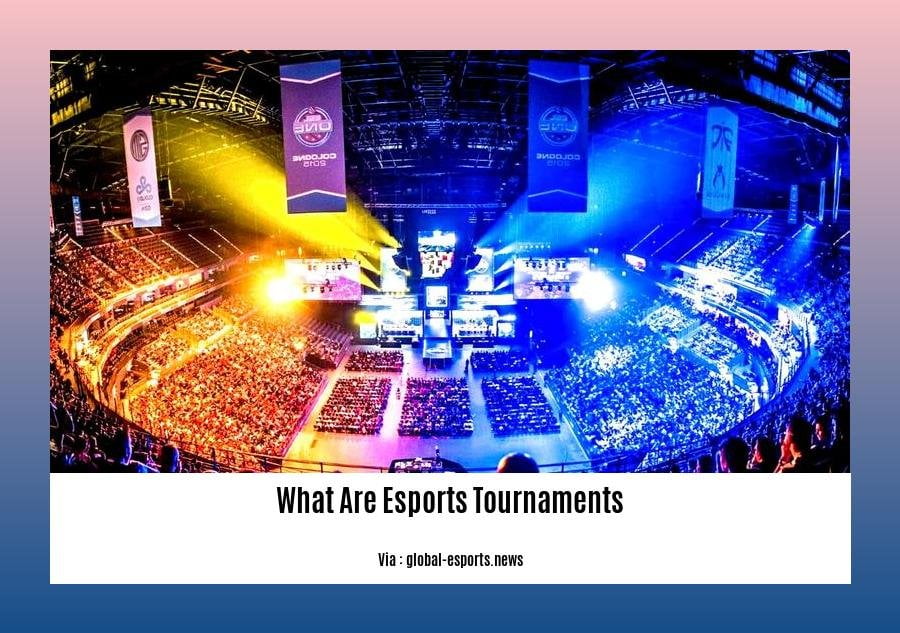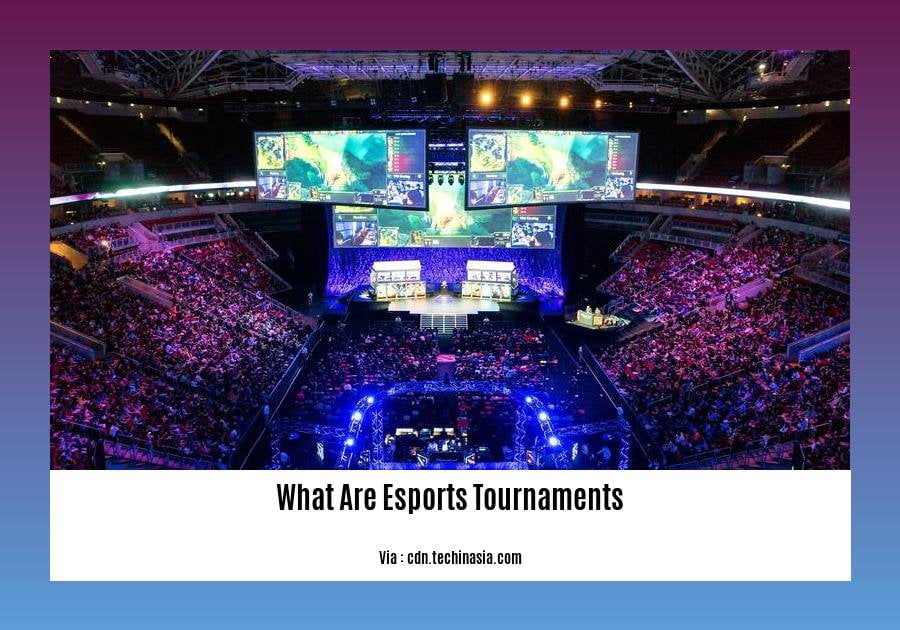Welcome to the captivating realm of esports tournaments, where gamers from around the world converge in a digital battlefield to showcase their extraordinary skills and strategic prowess in competitive gaming. In this guide, we delve into the electrifying world of esports tournaments, exploring their various formats, the strategies employed by top players, and the captivating spectacles that unfold as teams vie for victory. Get ready to immerse yourself in the adrenaline-fueled matches, marvel at the incredible plays, and discover the unique charm of esports competitions. Join us as we unravel the secrets of esports tournaments: What Are Esports Tournaments: A Guide to Competitive Gaming Competitions.
Key Takeaways:
-
Esports tournaments are organized multiplayer video game competitions between professional players, individually or in teams.
-
Competitions can be watched in huge stadiums or streamed online.
-
Esports tournaments can have solo, duo, or squad events.
-
Esports tournaments allow fans to witness top-level gaming competitions and learn more about the game.
-
Examples of major esports tournaments include the League of Legends World Championship and the Fortnite World Cup.
What Are Esports Tournaments?

Esports tournaments are riveting, highly competitive gaming events where professional gamers, individually or in teams, engage in intense multiplayer video game matches. These tournaments have become a global phenomenon, watched by millions of passionate fans either live in stadiums or through online streaming platforms.
Key Characteristics:
-
Organized and Multiplayer: Esports tournaments are meticulously organized events, featuring multiplayer video game matches where teams or solo players face off against each other.
-
Global Spectatorship: Esports tournaments captivate audiences worldwide. Fans can witness these fierce competitions live in colossal stadiums or conveniently watch them streamed online.
-
Diverse Event Formats: Esports tournaments offer a variety of formats. They can be solo events where individual players showcase their skills, duo events where pairs of players team up, or squad events where multiple players collaborate to achieve victory.
Examples of Popular Esports Tournaments:
-
League of Legends World Championship: As the pinnacle of League of Legends esports, this annual tournament gathers the world’s top teams to compete for the title of world champion.
-
Fortnite World Cup: This highly anticipated yearly event brings together the most skilled Fortnite players from across the globe to compete for a share of a massive $30 million prize pool.
Unveiling the Significance of Esports Tournaments:
Esports tournaments serve as a platform for gamers to showcase their exceptional skills, strategic thinking, and lightning-fast reflexes. These events also provide an avenue for fans to immerse themselves in the exhilarating world of competitive gaming, learning intricate details and strategies of their favorite games. Additionally, esports tournaments contribute to the growth of the gaming industry, attracting sponsorships, investments, and media attention.
Esports tournaments are a testament to the convergence of technology, gaming, and entertainment. They have revolutionized the gaming landscape, transforming it into a global phenomenon that continues to captivate audiences with its thrilling competitions and exceptional display of gaming prowess.
If you’re an avid fan of competitive gaming, immerse yourself in the rich history of esports tournaments, where champions have been crowned and legendary moments have unfolded.
For those seeking an in-depth understanding of the evolution of esports, dive into the fascinating history of esports events, discovering the milestones that shaped the industry.
To delve into the origins and growth of esports, embark on a journey through the dynamic history of esports, exploring the pivotal moments that propelled this phenomenon to global recognition.
Explore the diverse and thrilling list of esports tournaments, showcasing the most prestigious competitions where players from around the world compete for glory and substantial prize pools.
Don’t miss the opportunity to learn about the most spectacular biggest esports event in history, an event that shattered records and captivated audiences worldwide with its grandeur and unforgettable moments.
Types of Esports Tournaments and Popular Games

The world of esports is vast, encompassing a diverse array of competitive gaming tournaments. Let’s delve into the various formats and the most popular games that ignite the passion of esports enthusiasts worldwide.
Tournament Formats:
The adrenaline-pumping excitement of esports tournaments largely hinges upon their formats, which determine the structure and progression of the competition.
1. Single Elimination:
– Brace yourself for the intensity! In single-elimination tournaments, each match is a do-or-die affair.
– Winners advance, while losers bid farewell to their championship dreams.
– With no room for error, every moment is a test of skill, resilience, and the ability to perform under pressure.
– Popular Games: Fighting games like Tekken and Street Fighter, racing games like Rocket League and Forza, often adopt this format.
2. Double Elimination:
– Double elimination provides a safety net for competitors, offering a second chance at glory.
– Players compete in two brackets: the winners’ bracket and the losers’ bracket.
– After a loss in the winners’ bracket, players drop to the losers’ bracket, where they can still fight their way back to the grand finals.
– Popular Games: This format is commonly used in Dota 2, League of Legends, and Counter-Strike: Global Offensive, where the stakes are high, and every victory counts.
3. Round Robin:
– Round robin tournaments pit every competitor against each other in a series of matches.
– The standings are determined based on the number of wins, losses, and points accumulated.
– This format allows for more nuanced strategies and showcases consistency and adaptability.
– Popular Games: Real-time strategy games like StarCraft II and Age of Empires, where players must adapt their strategies based on their opponents’ moves, thrive in this format.
Popular Esports Games:
The esports scene boasts a wide range of popular games that attract millions of viewers and generate massive prize pools.
1. League of Legends:
– A fast-paced, strategic team-based game where players compete to destroy the enemy’s base while defending their own.
– With a vast champion pool and ever-changing meta, League of Legends demands teamwork, coordination, and individual skill.
2. Dota 2:
– A complex and rewarding multiplayer online battle arena (MOBA) that requires strategic thinking and tactical execution.
– Players control powerful heroes with unique abilities, battling to destroy the enemy’s ancient.
– Dota 2 is known for its steep learning curve but offers immense depth and a thriving competitive scene.
3. Counter-Strike: Global Offensive:
– A tactical first-person shooter where two teams compete in objective-based scenarios.
– Players assume the role of either terrorists or counter-terrorists, engaging in intense gunfights and strategic maneuvers.
– Counter-Strike: Global Offensive emphasizes precision, teamwork, and map awareness.
4. Fortnite:
– A battle royale phenomenon that took the world by storm.
– Players parachute onto an island and scavenge for weapons and resources to eliminate opponents and be the last one standing.
– Fortnite’s unique building mechanic adds a layer of complexity and creativity to the battle royale genre.
5. Call of Duty:
– A long-standing first-person shooter franchise with a dedicated esports following.
– Call of Duty esports features fast-paced, action-packed matches with a focus on teamwork and individual skill.
Key Takeaways:
- Esports tournaments showcase the exceptional skills, strategic thinking, and lightning-fast reflexes of professional gamers.
- Various tournament formats, such as Single Elimination, Double Elimination, and Round Robin, cater to different games and playstyles.
- Popular esports games like League of Legends, Dota 2, Counter-Strike: Global Offensive, Fortnite, and Call of Duty attract millions of viewers and generate massive prize pools.
- The esports industry is a rapidly growing global phenomenon, revolutionizing the gaming landscape and captivating audiences with thrilling competitions.
Sources:
Esports Tournament Formats Explained
The 10 Most Popular Esports Games in the World
Competitive Scene and Notable Rivalries
In the captivating world of esports, the competitive scene is a thrilling battlefield where skilled gamers, fierce rivalries, and unforgettable moments collide. These rivalries have played a pivotal role in shaping the esports landscape, captivating fans with intense matches and unforgettable storylines.
Key Takeaways:
- Esports rivalries ignite passion and excitement within the gaming community.
- Famous rivalries have occurred across various esports titles, including Dota 2, StarCraft, and Call of Duty.
- Iconic rivalries have showcased exceptional skill, strategic depth, and mental fortitude.
- Rivalries have fueled intense matches, off-field drama, and memorable moments.
Na`Vi vs Alliance – Dota 2:
Eastern Europe’s NaVi and Western Europe's Alliance emerged as dominant forces in Dota 2, captivating fans with their strategic prowess and exceptional teamwork. Their rivalry reached its zenith in 2013 when Alliance claimed the championship title at The International 3, defeating NaVi in a thrilling grand finals match.
Flash vs Jaedong – StarCraft:
South Korea’s Flash and Jaedong are legendary figures in the StarCraft scene, renowned for their mastery of the game’s intricate mechanics and innovative strategies. Their decade-long rivalry pushed the boundaries of StarCraft gameplay, showcasing the game’s depth and complexity.
Daigo vs Justin Wong – Street Fighter:
Japanese player Daigo Umehara and American player Justin Wong have been fierce rivals in the Street Fighter series for over two decades. Their iconic rivalry reached new heights in 2004 when Daigo pulled off an incredible comeback against Justin Wong at the Evo tournament, coining the term “Evo Moment #37.” This moment remains a defining highlight in fighting game history.
FaZe Clan vs OpTic Gaming – Call of Duty:
FaZe Clan and OpTic Gaming are two of the most prominent esports organizations, known for their exceptional Call of Duty teams. Their rivalry has been fueled by intense matches, off-field drama, and a passionate fan base. The two organizations have traded victories and championships, keeping the Call of Duty scene on the edge of its seat.
These notable rivalries have elevated the competitive scene, showcasing the exceptional skills, strategic thinking, and unwavering dedication of esports athletes. They have captivated fans, fueled storylines, and contributed to the growth and popularity of esports worldwide.
Citations:
Benefits, Challenges, and Responsible Gaming Practices
Esports tournaments have brought a surge of excitement to the gaming world, offering a platform for gamers to showcase their skills, compete against others, and connect with fellow enthusiasts. But beyond the thrill of competition, it’s crucial to consider the benefits, challenges, and responsible gaming practices associated with esports tournaments.
Benefits of Esports Tournaments
* Fostering Social Connections:
Esports tournaments create a sense of community, allowing gamers to interact, collaborate, and form lasting friendships.
-
Developing Soft Skills:
Participating in tournaments helps gamers hone critical thinking, strategic planning, and teamwork skills that translate into other aspects of their lives. -
** Promoting Physical and Mental Well-being:**
Esports can encourage physical activity through active gaming and promote mental well-being by reducing stress and improving cognitive function. -
** Career Opportunities:**
Esports tournaments can serve as a stepping stone for aspiring professional gamers, offering opportunities for sponsorships, endorsements, and even a path to a full-time career in the gaming industry.
Challenges of Esports Tournaments
* Addiction and Health Risks:
Excessive gaming can lead to addiction, sleep deprivation, and physical health issues if not balanced with other activities.
-
Negative Stereotypes:
Esports tournaments can perpetuate negative stereotypes about gamers, such as social isolation and poor academic performance. -
Financial Investment:
Participating in esports tournaments can involve significant financial commitments, including travel expenses, equipment costs, and tournament fees.
Responsible Gaming Practices
* Time Management and Balance:
Gamers should prioritize their responsibilities and allocate time for both gaming and other aspects of their lives, such as education, work, and personal relationships.
-
Parental Involvement and Education:
Parents should engage with their children about esports, understand the potential risks and benefits, and set appropriate limits on gaming time. -
Promoting Physical Activity:
Esports tournaments should encourage physical activity by incorporating breaks for stretching, exercise, or promoting active lifestyles outside of gaming. -
Mental Health Support:
Esports organizations should provide resources and support for gamers struggling with mental health issues, such as stress, anxiety, or depression.
Key Takeaways:
-
Esports tournaments offer benefits like social connections, skill development, and career opportunities.
-
Challenges include addiction risks, negative stereotypes, and financial commitments.
-
Responsible gaming practices involve time management, parental involvement, physical activity, and mental health support.
Relevant URL Sources:
-
The Benefits and Risks of Esports Tournaments
FAQ
Q1: What are esports tournaments?
A1: Esports tournaments are organized, multiplayer video game competitions, typically between professional players, individually or as teams. These events showcase the highest levels of gaming competition and allow fans to witness thrilling matches and impressive displays of skill.
Q2: What are the different types of esports tournaments?
A2: Esports tournaments can vary in format, but common types include single elimination, where the loser is eliminated after one match, and double elimination, which provides a second chance for teams or players who lose in the early rounds.
Q3: What are some of the benefits of participating in esports tournaments?
A3: Participating in esports tournaments can provide opportunities for players to connect with like-minded individuals, form communities, and develop social-emotional skills like teamwork, communication, and empathy. Additionally, esports tournaments can help foster STEM education and provide a platform for players to showcase their skills and potentially pursue gaming-related careers.
Q4: What are some of the notable esports rivalries?
A4: Esports has seen several iconic rivalries over the years, including Na`Vi vs Alliance in Dota 2, Flash vs Jaedong in StarCraft, Daigo vs Justin Wong in Street Fighter, and FaZe Clan vs OpTic Gaming in Call of Duty. These rivalries have captivated fans with intense matches, exceptional skill displays, and off-field drama.
Q5: What are some of the benefits of esports tournaments for communities and individuals?
A5: Esports tournaments contribute to community building by providing platforms for players to interact and form connections. They can also benefit individuals by fostering social-emotional learning skills, promoting STEM education, and providing opportunities for participation regardless of physical abilities or limitations. Additionally, esports tournaments can contribute to the growth of the esports industry, creating potential career pathways in gaming, broadcasting, and event management.
- Unraveling Einstein’s Legacy: Who Inherited His Genius? - July 14, 2025
- Unlock Einstein’s Family Tree: Bernhard Caesar & Untold Stories - July 14, 2025
- Unveiling Bernhard Caesar Einstein: His Life & Albert Einstein’s Legacy - July 14, 2025
















